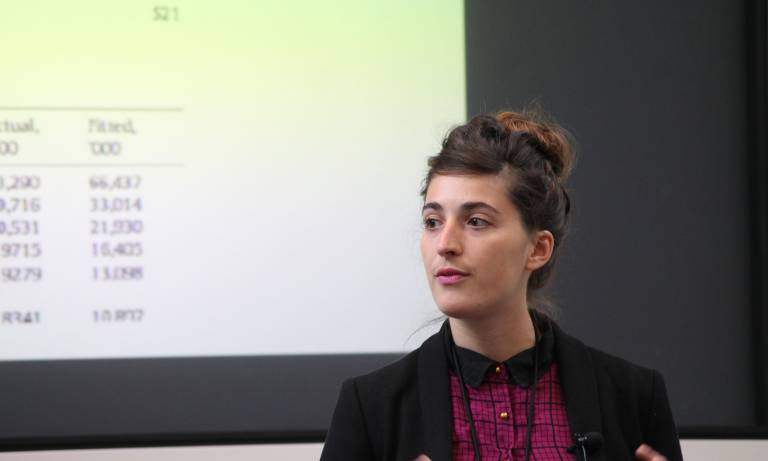Spotlight On: Clémentine Cottineau
8 May 2017
Clémentine is a geographer and economist, post-doc at CASA between 2014 and 2017. She investigates the multi-scale dynamics of urban inequality.

Role & Project: Clémentine is a research associate on the Urban Dynamics Lab grant, an EPSRC project led by Professor Alan Penn (UCL Space Syntax), Dr Elsa Arcaute, Professor Michael Batty (UCL CASA), Professor Paul Longley (UCL Geography), Professor Philip Treleaven (UCL Computer Science) and Professor Sir Alan Wilson (Alan Turing Institute). This project aims at providing tools for local authorities to better evaluate their options and policies to help rebalance the UK spatial economy.
How would you summarise your personal research?
In my research, I use tools from complexity science to investigate urban inequality and spatial economic disparities. For example, I have used agent-based models to simulate the process of urbanisation in the post-Soviet space, or urban scaling laws to explain the distribution of wages and income in cities of different sizes.
Tell us a little about the research you’re doing at the moment:
At the moment, I am investigating the role of microscopic economic networks in the transformation of the spatial structure of urban economies, by looking at the evolving location of individual firms in London at distant points in time. For the current period, I use secure business structure datasets from the ONS Virtual Microdata Laboratory, which describes 3 million firms in the UK over the last 15 years. For the previous period, I am working on the extraction of similar information from the 19th century registers. With these, I work to identify industrial clusters using innovative methods developed with Elsa Arcaute and study the way they have shaped the city over time, hoping to find permanence and transience in these clusters’ location, as well as clues about the future of London’s economic space. In parallel, I collaborate with various researchers on the topics of spatial segregation and economic inequality between cities.
Recent publications
contributing author in the book: Pumain D. (Coord.), Reuillon R. (Coord.), 2017, Urban dynamics and simulation models, Springer, 150p.
peer-reviewed article: Cottineau C., Arcaute E., Hatna E., Batty, M., 2017, “Diverse cities or the Systematic Paradox of Urban Scaling Laws”, Computer, Environment and Urban Systems (CEUS), Vol. 59, DOI: 10.1016/j.compenvurbsys.2016.04.006
Recent talks
April 28th 2017 at Data Natives, London: MetaZipf. A dynamic meta-analysis of city size distributions
March 13th 2017 at Urbanics III, Pucon (Chile): Trajectories of Urban inequality.
What is your favourite thing about CASA?
My favourite thing about CASA is its creative diversity and the blending of digital projects with physical productions: even though I work with rather traditional supports (web applications, tables, maps and even paper!), I love that it is possible to run projects on the side like 3D-printing a London-shaped cookie cutter for the Christmas Party! It fuels new ideas for further research and visualisation.
Where can people find out more about your work?
Published papers, code and data: http://clementinecttn.github.io/
Upcoming public talks:
- May 22nd, 5:30pm in London. Bartlett Future Cities Doctoral Network’s seminar. http://www.ucl.ac.uk/urbanlab/events/nightlife-spaces-and-the-future-city
- June 5th, 11:15am in Dublin. Regional Science Association Annual Meeting. http://www.regionalstudies.org/conferences/conference/rsa-dublin-2017
Project website: https://www.ucl.ac.uk/urban-dynamics-lab
 Close
Close

